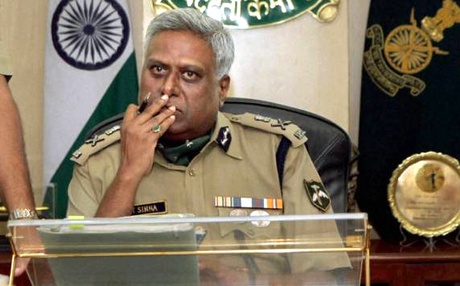CBI director Ranjit Sinha has made a brave claim for autonomy. But only the Supreme Court can extract it from Sinha’s own minister, minister of state for personnel V Narayanaswamy, and finance minister P Chidambaram, who chairs the five-member group of ministers.
The director of India’s premier investigation agency, the Central Bureau of Investigation (CBI), is making a case for autonomy before a group of ministers (GoM), his political masters.
Ranjit Sinha, the CBI director since December 2012, is eager to rid of his agency’s "caged parrot" tag. His argument centres around greater functional and financial autonomy.
Sinha is riding on the back of the Supreme Court (SC), which is expecting the government and him to hammer together a credible enough dispensation by July 10. In an interview, the director has described this as an opportunity that comes once in 50 years!
ALSO READ: To keep the parrot caged
The CBI chief has made no secret that in his book the autonomy to investigate fearlessly includes financial autonomy. Over 82 percent of his budget is consumed in salaries. Even the glittering CBI headquarters in New Delhi has only 50 percent of the funds that it needs to run – its phone lines were cut by Mahanagar Telephones earlier this year because the probe agency had no money to honour the bills!
Suffice to say the CBI has to grovel before the ministries of finance and personnel for even basic things. Ironically, therefore, it is finance minister P Chidambaram who heads the GoM that the government cobbled together in May to save face before the apex court in July hearing of a matter relating to CBI investigation into allocations of coal where the issue of “caged parrot” came to the fore.
Facing an SC censure, Sinha had gone public that his agency works under the superintendence of the government. As the agency director he reports to the secretary, department of personnel and training (DoPT), who is an Indian Administrative Service (IAS) officer, on overall matters pertaining to the Delhi Special Police Establishment Act.
Thus, as he makes a claim for autonomy Sinha has to extract it from his own minister: the MoS for personnel, V Narayanaswamy, who is also on the GoM.
(CBI’s other boss is the Central Vigilance Commission (CVC) which, as per an earlier order of SC, kicks in when matters fall under the Prevention of Corruption Act. Foreign minister Salman Khurshid, minister for communications and information technology and law Kapil Sibal and minister of state for information and broadcasting-independent charge Manish Tewari are the other three members of the GoM besides Chidambaram and Narayanaswamy. The PM has asked the GoM to prepare the draft affidavit to be filed in the apex court in this context.)
Sinha’s wish list includes having powers to pick up officers on deputation. This entails CBI having some say in choosing senior Indian Police Service (IPS) officers, allotted to various state cadres and the union territories.
At present, central deputation of IPS officers falls with the ambit of the ministry of home affairs (MHA) and the DoPT.
DoPT services the appointments committee of cabinet (ACC), CVC covers the vigilance angle, and the CBI director is left with little elbow room in who mans the highest echelons of his agency.
In a parallel, as if in a pincer for IPS officers who serve the CBI, since 1997 politicians have nurtured a CBI Group ‘A’ service which is demanding that they should be allowed to dominate key positions. Sinha opposes this as is evident in his deposition quoted on Page 53 by the parliamentary committee of personnel, public grievances and pensions in its report submitted on May 3 (read).
The political class feels differently. At variance with Sinha, rather than forging ties from a countrywide pool of IPS officers, several standing committees, past and present, have preferred to nurture a smaller set of home-grown investigators.
Sinha also expects to have the final word on counsels he can engage and filing of court appeals. The CBI-attorney general relationship nosedived when the apex court found variance in their versions on whether or not then law minister Ashwani Kumar had tampered with the CBI affidavit on the coal scam.
The key questions which the GoM, vide government’s forthcoming affidavit, has to make is whether CBI can be made an independent body like the comptroller and auditor general, which draws its funds from the Consolidated Fund of India, not any line ministry.
Also, can there be a practical separation of investigation and prosecution?
From indications till date, Chidambaram believes that letting the “parrot” out completely is not in national interest. “All over the world--all bodies are accountable to somebody--they are accountable to executive, they are accountable to the legislature, they are accountable to the courts. I think what we have to ensure is that no one interferes with the investigations of the CBI,” he told NDTV a few weeks back.
“That’s what we have to ensure and I am confident my group will assure that,” he said, even as he wasn’t pushed on how financial and personnel autonomy can be left out of the calculus.
Detractors also point out that CBI is overrated in its quality of investigations and rate of prosecution. This doesn’t come to light as the agency is protected from citizen queries under the Right to Information Act. Some courts have severely criticised its functioning and harassment faced by some accused who later got acquitted.
The tendency to reward CBI chiefs, protected by a fixed two-year term, with a post-retirement sinecure has also been questioned. Sinha’s immediate predecessor, AP Singh, was made a member of the Union Public Service Commission, within two months of demitting office.

